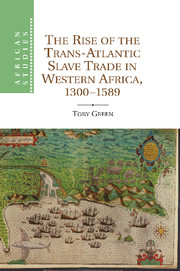Book contents
- Frontmatter
- Contents
- List of Maps
- Acknowledgements
- Abbreviations
- Glossary
- Introduction Rethinking the Trans-Atlantic Slave Trade from a Cultural Perspective
- Part One The Development Of An Atlantic Creole Culture In Western Africa, Circa 1300–1550
- 1 Culture, Trade and Diaspora in Pre-Atlantic Western Africa
- 2 The Formation of Early Atlantic Societies in Senegambia and Upper Guinea
- 3 The Settlement of Cabo Verde and Early Signs of Creolisation in Western Africa
- 4 The New Christian Diaspora in Cabo Verde and the Rise of a Creole Culture in Western Africa
- 5 The New Christian/Kassanké Alliance and the Consolidation of Creolisation
- Part Two Creolisation And Slavery
- Bibliography
- Index
1 - Culture, Trade and Diaspora in Pre-Atlantic Western Africa
from Part One - The Development Of An Atlantic Creole Culture In Western Africa, Circa 1300–1550
Published online by Cambridge University Press: 05 November 2011
- Frontmatter
- Contents
- List of Maps
- Acknowledgements
- Abbreviations
- Glossary
- Introduction Rethinking the Trans-Atlantic Slave Trade from a Cultural Perspective
- Part One The Development Of An Atlantic Creole Culture In Western Africa, Circa 1300–1550
- 1 Culture, Trade and Diaspora in Pre-Atlantic Western Africa
- 2 The Formation of Early Atlantic Societies in Senegambia and Upper Guinea
- 3 The Settlement of Cabo Verde and Early Signs of Creolisation in Western Africa
- 4 The New Christian Diaspora in Cabo Verde and the Rise of a Creole Culture in Western Africa
- 5 The New Christian/Kassanké Alliance and the Consolidation of Creolisation
- Part Two Creolisation And Slavery
- Bibliography
- Index
Summary
Western Africa is a region marginalised in the world’s geopolitics. Yet it was not always so. The coast stretching from the baobab-sprinkled scrubland by the Senegal River down to the creeks and forests of Sierra Leone saw exchanges between Africans and Europeans in the fifteenth century which formed a prototype for the relationships between European imperial emissaries and others that have defined so much subsequent world history.
The cultural world established in Western Africa at the time of these exchanges did not spring from nothing. Rather, it developed from antecedents which had shaped fifteenth-century societies on the Upper Guinean coast. By the 1440s, this was a region where already for several centuries there had been a tradition of accommodation to the presence of powerful and at times violent outsiders who represented the commercial and political interests of the empire of Mali.
- Type
- Chapter
- Information
- Publisher: Cambridge University PressPrint publication year: 2011

